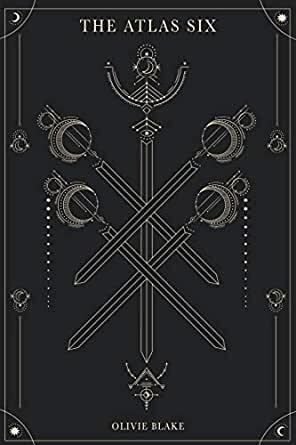The Atlas Six, and Yet Another Reason to Defend Fanfiction: A Book Review
I spent a large chunk of my day yesterday reading The Atlas Six, by Olivie Blake. I’d been looking forward to this book for months—I don’t think anyone on the planet would be surprised that I’d enjoy it. It’s an ensemble cast of flawed, intelligent, interesting characters. Anyone could be a villain. Everyone’s close to a breaking point. They’re all chasing knowledge, in some way or another. The plot revolves, in part, around the Library of Alexandria. Also, there’s murder.
So yeah, obviously. I liked it.
It helps, I think, that I’m familiar with Olivie Blake’s writing. How, you might ask? Well, some of you know that I read and write fanfiction. Olivie Blake does, too—and hers is unquestionably brilliant. She writes flawed-but-likeable very well—almost as well as she writes charismatic-slimy-and-utterly-unlikeable. Her writing is accessible, dreamlike, sharp. The Atlas Six strikes me as the kind of book that one cannot write without a great deal of practice—specifically, practice with character, with grandiose settings, and with a constant source of feedback allowing for evolution of writing style.
The kind of practice, that is, that you get while writing fanfiction. Which says something, I think, about how useful it is to be able to workshop a craft in a space where the only goal is to write, to publish, and to grow, as opposed to spaces where everything is driven by money and success. But I digress.
This is not to say, at all, that The Atlas Six reads like fanfic. It doesn’t. It reads like a fully-fleshed out world of its own. If it shares elements with other books that I love—magical secret societies, the intersection of magic and academia, alliances-with-benefits, rivalries-to-grudging friendships… well, that says more about what I love than what this author has borrowed from, I think.
Blake is a master of working with the elements of what makes a story—prose, character, setting, and conflict.
The prose is gorgeous, but ultimately not the strongest point. Fans of Ms. Blake’s know that her strength seems to have always been character– she writes dialogue and tone better than almost anyone. Her characters feel like people, they talk like people, and yet they are elevated—everyone, no matter how inconsequential, could Matter. Could be a Main Character. And that’s important—because in real life, no one sees themselves as the side character. Not really. Everyone can be a main character, with the right nudge—whether that’s a nudge to protagonism or over the edge into villainy. Blake understands that better than most, and it is this understanding, I think, that makes even the most lacking of her characters compelling. It’s also worth noting that she’s managed to write a surprisingly diverse cast of characters without making anything feel like token inclusion, which is great to see.
The setting works nicely, but for me, there isn’t much to say about it—despite the fact that these characters are, ostensibly, in a gorgeous library in London, we never see much of London or the library. Which, to me, is a shame—I’d have liked to see more there. I wanted a Sanctum Sanctorum and I got… a study room in the British Library, or the conference room in the building where I had classes when I studied abroad. Blake is capable of lush, grand, sweeping descriptions—I spent some of this book wishing for more of them.
That said, the book redeems itself when it comes to conflict. Having read some of Blake’s other work, I can confirm that this is where Blake excels. What happens when you place six extremely bright, very magical people in a house together, tell them that five will achieve infinite knowledge and entrance to a secret society and the sixth simply won’t? The premise of the novel is in itself a conflict. Every character enters aware that this is a competition. Some are framing their fellow inductees as allies or foes or competition from the start, whereas others are looking for friends. One in particular enters, apparently looking for an enemy. Conflict is all about perspective, and implicit understanding of character. Blake’s inherent sense of both works beautifully.
I’d recommend The Atlas Six for people whose answer to “If you could go back in time to any era, where/when would you go?” is “The Library of Alexandria.” I’d also recommend it to people who loved The Invisible Life of Addie Larue as much as I did, for those who read Erin Morgenstern’s work, for anyone looking for a good trolley problem in the shape of a book, for those who like double-crosses and the idea of poisoning someone over tea while wearing a brocade gown.




